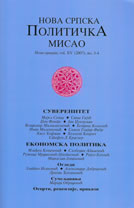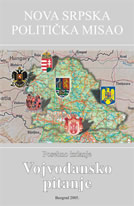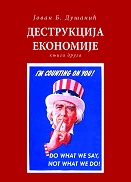| NSPM in English | |||
How do you say "frenemy" in Turkish? |
 |
 |
 |
| субота, 12. јун 2010. | |
|
(Foreign Policy, June 1, 2010)
Recently, my colleague and good friend, Charles Kupchan, published a book called How Enemies Become Friends. In it, he argues that diplomatic engagement is decisive in transforming relations between adversaries. It is an interesting read, and the book has received some terrific reviews. Charlie might want to follow up with a new book called How Friends Become Frenemies. He can use the United States and Turkey as his primary case study. It is hard to admit, but after six decades of strategic cooperation, Turkey and the United States are becoming strategic competitors -- especially in the Middle East. This is the logical result of profound shifts in Turkish foreign and domestic politics and changes in the international system. This reality has been driven home by Turkey's angry response to Israel's interdiction of the Istanbul-organized flotilla of ships that tried Monday to break the Israeli blockade of Gaza. After Israel's attempts to halt the vessels resulted in the deaths of at least nine activists, Turkish Foreign Minister Ahmet Davutoglu referred to Israel's actions as "murder conducted by a state." The Turkish government also spearheaded efforts at the U.N. Security Council to issue a harsh rebuke of Israel. Monday's events might prove a wake-up call for the U.S. foreign-policy establishment. Among the small group of Turkey watchers inside the Beltway, nostalgia rules the day. U.S. officialdom yearns to return to a brief moment in history when Washington and Ankara's security interests were aligned, due to the shared threat posed by the Soviet Union. Returning to the halcyon days of the U.S.-Turkish relationship, however, is increasingly untenable. This revelation comes despite the hopes of U.S. President Barack Obama, whose inauguration was greeted with a sigh of relief along both the Potomac and the Bosphorus. Officials in both countries hoped that the Obama administration's international approach, which emphasized diplomatic engagement, multilateralism, and regional stability, would mesh nicely with that of Turkey's ruling Justice and Development Party. The White House made it clear from the beginning that Turkey was a priority for Obama, who raised the idea of a "model partnership" between the two countries. Turkey, the theory went, had a set of attributes and assets that it could bring to bear to help the United States achieve its interests in the Middle East, Central Asia, and the Caucasus. Naturally, as a longtime U.S. ally, Turkey was thought to share America's interests in these regions. That was the thinking, anyway. A little more than a year after Obama addressed the Turkish Grand National Assembly, Washington seems caught between its attempts to advance this model partnership, and recognition of the reality that Ankara has moved on. This desire to restore close relations with Turkey is partially based on a rose-tinted view of the alliance's glory days; even then, the relationship was often quite difficult, buffeted by Turkey's troubled relations with Greece, Ankara's invasion of Cyprus, and the Armenian-American community's calls for recognition of the 1915 massacres as genocide. Back then, Turkey was a fractious junior partner in the global chess game with the Soviets. Today, Turkey is all grown up, sporting the 16th largest economy in the world, and is coming into its own diplomatically. Nowhere is Turkey asserting itself more than in the Middle East, where it has gone from a tepid observer to an influential player in eight short years. In the abstract, Washington and Ankara do share the same goals: peace between Israel and the Palestinians; a stable, unified Iraq; an Iran without nuclear weapons; stability in Afghanistan; and a Western-oriented Syria. When you get down to details, however, Washington and Ankara are on the opposite ends of virtually all these issues. For the first time in its history, Ankara has chosen sides in the Israeli-Palestinian conflict, demanding that Israel take steps to ease the blockade of Gaza or risk unspecified "consequences." Well before the recent crisis, the Turks had positioned themselves as thinly veiled advocates for Hamas, which has long been on the U.S. State Department's list of terrorist organizations. In public statements, Turkish Prime Minister Recep Tayyip Erdogan has compared Turkey's Islamists and Hamas. Implicit in these declarations is a parallel to Erdogan's own Justice and Development Party, whose predecessors were repeatedly banned from politics. This parallel is rather odd. Turkey's Islamists always sought to process their grievances peacefully, while the Islamic Resistance Movement -- Hamas's actual name -- has a history of violence. Ankara's warm embrace of Hamas has not only angered the Israelis, but other U.S. regional allies including Egypt, the Palestinian Authority, and Saudi Arabia. Even in Afghanistan, there's less to Turkey's vaunted cooperation than meets the eye. Turkey was the first ally to offer troops to U.S. efforts there in 2001, and more recently, it has doubled its contingent of soldiers to almost 1,700. However, Ankara has consistently -- like other NATO allies -- refused to throw these forces into the fight, even after the Obama administration's entreaties to do more as part of the Afghan "surge." Ankara also took a lot of heat from George W. Bush's administration for its good relations with the Syrian regime, though the United States eventually reconciled itself to the logic of Turkey's interests in its southern neighbor. Turkey sees its ties with Syria as a hedge against Kurdish nationalism, believing that brisk cross-border trade will make everyone -- Turks, Kurds, and Syrians -- richer, happier, and less suspicious of one another. The close diplomatic ties have an added benefit for Washington: They give Syrian President Bashar al-Assad someone to talk to other than Iranian President Mahmoud Ahmadinejad and Hezbollah Secretary-General Hassan Nasrallah. That's the theory, anyway. But Ankara and Washington may well end up on opposite sides when it comes to the Assad regime. The Turks have been noticeably quiet about U.S. and Israeli allegations that Syria has either transferred Scud missiles to Hezbollah or trained Hezbollah fighters to use them in Syria. What will the Turks do if Israel launches a preventive strike against those missiles, now believed to be on the Syrian side of the border near the Bekaa Valley -- or if the Israel Defense Forces take the fight to Lebanon, where there are 367 Turkish soldiers serving in the U.N. peacekeeping force in South Lebanon? Whatever the exact scenario, conflict along Israel's northern border seems increasingly likely. In that event, Washington will no doubt endorse Israel's right to self-defense -- and Ankara will not. Perhaps the biggest issue separating the United States and Turkey is Iran. There is a full-blown controversy brewing over exactly what the Obama administration communicated to Erdogan and Brazilian President Luiz Inacio Lula da Silva before the two leaders traveled to Tehran in May. There, Lula and Erdogan hammered out a deal that would shift 1,200 kilograms of Iran's low-enriched uranium to Turkey in exchange for fuel for the Tehran Research Reactor (TRR). So far, Washington's explanation of what it did and did not tell Ankara and Brasilia is rather weak -- a perplexing lapse of communication and coordination for an administration that puts a premium on these virtues. Regardless of the Obama administration's mistakes, the Turkish-Brazilian deal demonstrates just how far apart Washington and Ankara are on Iran. The Obama administration sees the TRR agreement as yet another Iranian effort to split Washington, its allies in Europe, the Chinese, and the Russians, thereby forestalling a new round of U.N.-mandated sanctions, all while the Iranians continue to enrich uranium. The Turks think the deal is a promising start to the painstaking task of moving Washington and Tehran toward broader negotiations. The easy temptation is to blame creeping Islamization for Turkey's foreign-policy shift. There is no denying that there is an ideological component to much of Erdogan's rhetoric, especially when it comes to Israel. However, the prime minister is not the architect of Ankara's foreign policy; Foreign Minister Davutoglu is the man responsible for the country's new international activism. Bookish, soft-spoken and extremely smart, Davutoglu is not an Islamist. Rather, he correctly perceived the role Turkey can play in a much-changed world. The structural changes resulting from the end of the Cold War, Europe's continuing rebuff of Turkey, and the economic opportunities to the country's south, east, and north have driven Davutoglu's thinking, not the Quran. Moreover, despite the bitter political battle being played out in Turkey over the country's political trajectory, there is general agreement across the political spectrum on the direction of Turkish foreign policy. Other Turkish governments might have been more cautious about the TRR deal, but they certainly would be seeking to maintain good relations with Iran, Iraq, and Syria, not to mention Russia. The Obama administration has yet to grapple with the ways the structural changes in the international system have affected U.S.-Turkey relations. All the talk about strategic cooperation, model partnership, and strategic importance cannot mask the fundamental shift at hand. The stark reality is that while Turkey and the United States are not enemies in the Middle East, they are fast becoming competitors. Whereas the United States seeks to remain the predominant power in the region and, as such, wants to maintain a political order that makes it easier for Washington to achieve its goals, Turkey clearly sees things differently. The Turks are willing to bend the regional rules of the game to serve Ankara's own interests. If the resulting policies serve U.S. goals at the same time, good. If not, so be it. Moreover, Ankara's approach has proved enormously popular in Turkey and among average Arabs. This is why Erdogan seems all too willing to discuss Turkey's newly influential role in the Middle East at even the most mundane ribbon-cutting events, from Istanbul to the Armenian border. Indeed, it is abundantly clear that Erdogan and his party believe they benefit domestically from the position Turkey has staked out in the Middle East. Yet, it is lost on Washington that the demands of domestic Turkish politics now trump the need to maintain good relations with the United States. Given the mythology that surrounds the relationship, the divergence between Washington and Ankara has proved difficult to accept. Once policymakers recognize what is really happening, Washington and Ankara can get on with the job of managing the decline in ties with the least possible damage. Obama's goal should be to develop relations with Turkey along the same lines the United States has with Brazil or Thailand or Malaysia. Those relations are strong in some areas, but fall short of strategic alliances. "Frenemy" might be too harsh a term for such an arrangment, but surely "model partnership" is a vast overstatement. It's time to recognize reality. Steven A. Cook is the Hasib J. Sabbagh senior fellow for Middle Eastern studies at the Council on Foreign Relations. http://www.foreignpolicy.com/articles/2010/06/01/how_do_you_say_frenemy_in_Turkish |
Од истог аутора
Остали чланци у рубрици
- Playing With Fire in Ukraine
- Kosovo as a res extra commercium and the alchemy of colonization
- The Balkans XX years after NATO aggression: the case of the Republic of Srpska – past, present and future
- Из архиве - Remarks Before the Foreign Affairs Committee of the European Parliament
- Dysfunction in the Balkans - Can the Post-Yugoslav Settlement Survive?
- Serbia’s latest would-be savior is a modernizer, a strongman - or both
- Why the Ukraine Crisis Is the West’s Fault
- The Ghosts of World War I Circle over Ukraine
- Nato's action plan in Ukraine is right out of Dr Strangelove
- Why Yanukovych Said No to Europe

.jpg)








 Meet America’s new rival in the Middle East
Meet America’s new rival in the Middle East












